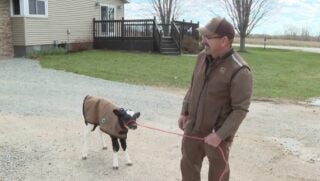With crop insurance start dates popping up across the country, many growers will head out for early corn planting this week and next. But before you put seed in the ground, you might want to consider these last-minute preparation tips and a look ahead at the forecast.
We had the pleasure visiting with Justin Jelsma, District Sales Manager, Wyffels Hybrids, at the Central Plains Dairy Expo in Sioux Falls, SD last week and he shared some recommendations the company’s agronomists have been making to their clients.
“First of all you want to make sure your planter is ready, where your populations are going to be at for your farm, for your ground,” Jelsma said. “You also want to look at ground temperature, where your seed depth is going to be at.”
Wyffels Hybrids recommends that ground temperature be at 55 degrees. Seed depth should be no less than an inch and a half and usually no more than two and ½ inches – ideally targeting a two-inch planting depth, depending on soil type and conditions.
But Jelsma cautions growers to not be in too much of a rush and to keep an eye on the sky.
“If the ground is fit to plant, a lot of guys are in a hurry trying to get that seed in the ground, especially after some of the weather events we had in our area last year with the big heavy rains,” Jelsma said. “You don’t necessarily want to plant all your seed right before that big rain. Especially when you are looking at seed corn and you get that first drink of water, you don’t want it to be a real cold drink — you could have germination issues, you could have emergence issues because of that.”
Finally, Jelsma advises making sure you have all your seed, looking at your chemical programs to ensure everything is ready there for pre-emergence and post-emergence programs, deciding on fertilizer for pre-emergence and side dressing programs, and determining if supplemental nitrogen needs to be applied this year.
As Jelsma pointed out, Wyffels Hybrids district sales managers and seed representatives are available long after planting to scout corn acres as well as scout other acres for people if they are considering working with the company in the future.
“If you have issues out there or something you want us to look at — get some extra eyes on the ground — let us know,” Jelsma said.



